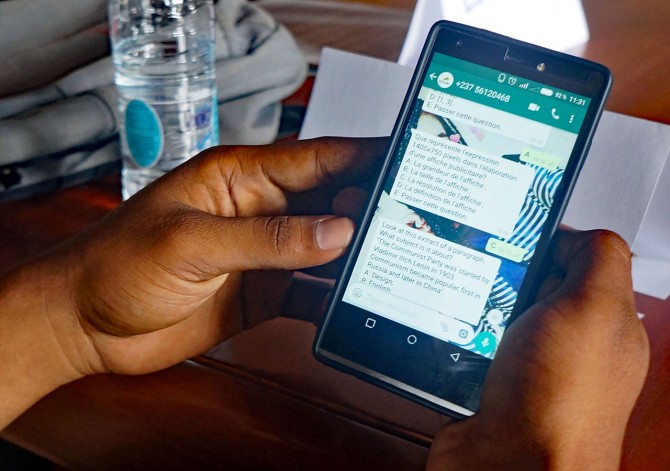When it comes to studying for their all-important baccalaureate exam, students in Cameroon are largely left to their own devices. Now a team of Cornell researchers wants to use those devices to help them prepare for the test.
The researchers sent a series of study questions via SMS and WhatsApp to Cameroonian students – an attempt to take advantage of growing phone use by African youths to combat some of the challenges they face. The study found that while the approach holds promise, participation rates, which hovered around 20%, were influenced by students’ perceptions of the project’s trustworthiness and their own security.
“There were definitely concerns about financial or security-based scams, rumors and fake news kinds of things,” said Anthony Poon, a doctoral student in the field of information science at Cornell Tech and first author of “Engaging High School Students in Cameroon with Exam Practice Quizzes via SMS and WhatsApp,” which will be presented at the ACM Conference on Human Factors in Computing Systems, May 4-9 in Glasgow, Scotland.
In sub-Saharan Africa, successful efforts to combat infant mortality in the early 2000s led to a demographic boom among youths between 15 and 24, who now comprise a fifth of the region’s population. In Cameroon, that population bulge has heightened the significance of the baccalaureate test, which can determine a student’s success in higher education and beyond.
Cameroon Poon Anthony CHI 2019.jpg

“This could be a huge opportunity for these countries, but at the same time it’s a huge challenge, because the labor markets young people are going into aren’t necessarily equipped to handle them,” Poon said. “That’s the context in which this work was started: Perhaps there are some very modest ways in which we can improve test scores to improve the outcomes of certain students.”
The researchers worked with PICHNET, a nongovernmental organization based in Cameroon that focuses on the nation’s youth bulge. After meeting with teachers and students, they developed a cloud-based automated service to manage their interactions with students. Quiz questions were written by teachers and intended to remind students to study and to inspire them to look up related materials.
They then sent 546 students three questions, three times a week – seeking to establish a regular schedule and not fatigue the students with too much work. Around 450 students received questions via SMS, and 96 via WhatsApp. Students received new questions only after answering the previous one.
The mean response rate to nearly 3,000 quiz questions sent over a three-week period was 19.5% – rising to 23% in the first two quizzes and declining as low as 15.6%. The students getting questions over WhatsApp were less likely to respond than those getting text messages – possibly because WhatsApp requires a smartphone, which may be controlled by the students’ parents, or which students may see as a device for entertainment rather than education.
Some students later said they were wary of answering the questions because they were unsure where they were coming from. Some were mistrustful of PICHNET. When students tried to reply to the texts or messages, they received automated responses, which confused them.
Many were simply suspicious because of the uncertainty of their environment. One participant said: “It must be said that as exams approached, I received messages from everyone, whether my friends or classmates, saying that here are the questions that will come during the exam. As we do not know where to put our head anymore, we don’t know what is true and what is wrong.”
Researchers did not look into the quizzes’ impact on baccalaureate grades in this study, though they plan to consider it in future work.
In the next version of the study, the researchers are addressing trust and security concerns, such as establishing a physical address and phone number to assure participants they really exist.
“We’re not just trying to prompt them to study – what we’re doing is reminding them of the importance of education and its impact on their future, so they’re not as inclined to take it easy,” Poon said. “The larger question is, how are values transmitted through the technology and through digital interactions that we have? And can we design in a way that enhances certain values and results in positive behavior change?”
The paper was co-authored by Sarah Giroux, lecturer and research associate in the Department of Development Sociology; Parfait Eloundou-Enyegue, professor and chair of the Department of Development Sociology; François Guimbretière, professor of information science; and senior author Nicola Dell, assistant professor of computer and information science at Cornell Tech.
The research was funded by grants from the U.S. Department of Defense and the Office of Engagement Initiatives.
This story by Melanie Lefkowitz originally appeared at the Cornell Chronicle on April 25, 2019.


